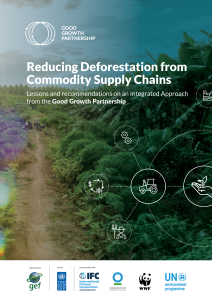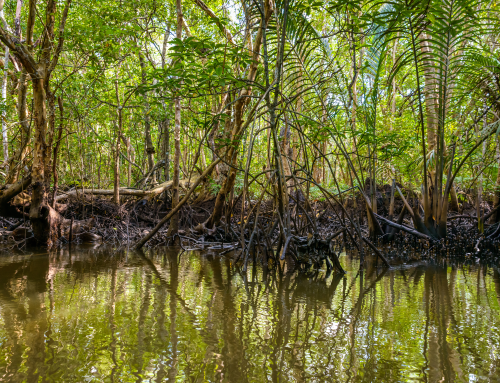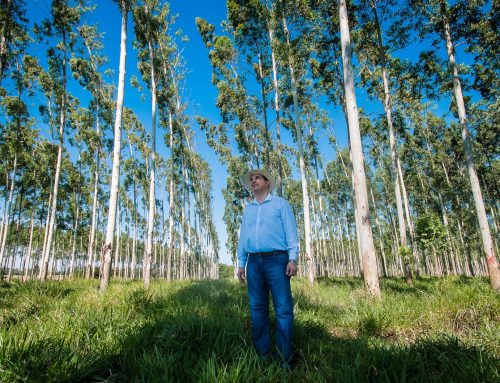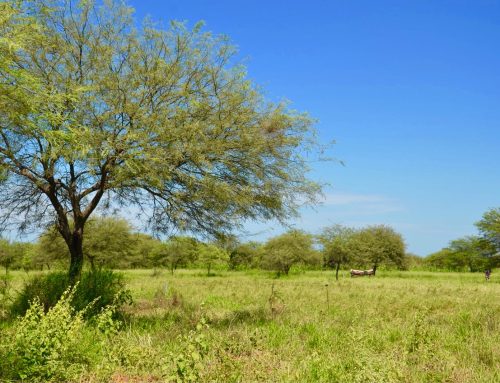Piloting GGP’s Integrated Approach in reducing deforestation.
We urgently need systemic change in commodity supply chains if we are to mitigate the combined threats of catastrophic climate change, biodiversity loss and food insecurity. Siloed and small-scale approaches have not delivered this. Now, a new report on the Good Growth Partnership Integrated Approach reveals that the four and a half-year programme has had real impact in laying the foundations for systemic change in palm oil, beef and soy supply chains, in partnership with four major producer countries: Indonesia, Brazil, Paraguay and Liberia.
An integrated approach can be defined as one which considers a system as a whole, in which interventions addressing different components and drivers in that system, are designed and/or managed together with the aim of creating synergies and additionality. In essence, moving the right levers at the right time and with the right intensity.
GGP’s Integrated Approach works across production, financing and demand to simultaneously reduce barriers and create enablers in multiple and connected parts of the system. This departure from focusing on one place, sector, or scale of action in favour of establishing connections between different initiatives and stakeholders in the system is an essential feature of the GGP.
The report identifies key learnings and gives recommendations which will increase the impact of future Integrated Approach efforts. It found that addressing production, demand and financing together significantly improves the ability of countries to generate change compared to more siloed approaches. Importantly, there is a multiplier effect in taking an integrated approach: by aligning and connecting stakeholders and changemakers, greater collective value is created and trust through a true sense of collaboration is built.
In Indonesia, for example, GGP has worked to reform sustainable production and land use policies, and increased farmers’ capacities to shift to sustainable practices. Simultaneously it has increased supply chain transparency and consumer demand for sustainable palm oil, and built the awareness of financial institutions to invest sustainably and screen out deforesters in their portfolio. The report says this combination under the Integrated Approach has created a space for transformative change that would not have developed under siloed approaches.
The report highlights the key challenges and success factors in the life cycle of a programme, guiding the success of future integrated approaches.

© Gustavo Leighton / Unsplash
The GGP experience teaches us that five guiding transformational practices are key to an effective Integrated Approach, as outlined by Mohamed Bakar, Lead Environmental Specialist at GGP funder the Global Environment Facility:
“The GGP was designed to take on the complex global supply chains for beef, palm oil, and soy with the ultimate aim of aligning and integrating sustainability actions that lead to reduced deforestation. This clearly called for a global initiative that 1) ensures consistent and quality participation by programme partners, 2) promotes system thinking and tools, 3) establishes inclusive and collaborative spaces for all supply chain stakeholders, 4) fosters agile and adaptive processes, and 5) advances the use of innovative tools to monitor and measure progress towards systemic change. These principles are at the core of the GEF focus on advancing the integrated approach to tackle major drivers of environmental degradation.”
As well as the increased effectiveness of the GGP Integrated Approach, the report shows that integrated programmes reduce overall transaction costs for donors because implementing partners co-ordinate better to produce total results that are greater than the sum of the parts.
Mohamed Bakar commented:
“In this decisive decade for the planet, we need to ensure more and faster impacts to achieve transformative change. While some see integrated approaches as being more complex to implement, the GGP experience shows that the results are well worth it. The report provides invaluable insights into how collaboration and dialogue can drive transformation across multiple supply chains and landscapes. This will no doubt inform existing and future GEF integrated programs designed to promote systemic shifts for a healthy and resilient planet.”
In all, this report provides 12 recommendations and highlights 8 different tools and resources that can support practitioners in generating additional value that outweighs the transaction costs required to deliver complex integrated approaches. Together with the five guiding transformational practices, these observations and recommendations are particularly valuable to practitioners directly involved in designing or delivering integrated approaches like the GGP.
The report concludes that GGP has successfully built enablers for sustainability in the production, demand and financing of three crucial commodities, in four countries across three continents. It has brought leading organisations together in close partnership, built trust and created shared knowledge and practice. It has engaged hundreds of stakeholders and collaborators, and supported thousands of beneficiaries.
GGP Global Project Manager Pascale Bonzom said:
“We have learnt many lessons throughout our almost 5 years of experience and are pleased to share with other changemakers recommendations on how to effectively design and implement such integrated approaches. We will also be sure to take them on board in our next phase, building on the strong foundations we have laid.”
“I’d like to pay tribute to our funder, the GEF, our GGP partners – Conservation International, the International Finance Corporation, the UN Environment Programme, the World Wildlife Fund – and the governments of Indonesia, Paraguay, Brazil and Liberia. Their hard work has been central to the success of GGP to date, which we look forward to continuing as part of the World Bank led FOLUR initiative and beyond.”
UNDP FACS Head Andrew Bovarnick said:
“Even with our meaningful successes there is still so much to do as systems change is complex and long-term. We see these five years as just the beginning and intend to keep building on the foundations we have established. We view the next phase of the Good Growth Partnership as a major contributor to the implementation of the United Nations’ action agenda on deforestation and conversion free supply chains. If our work resonates with you as a potential new partner or donor, we invite you to join us in this journey to place sustainability and good growth at the heart of commodity supply chains.”
Click on the image bellow to open the full document or here






